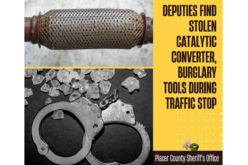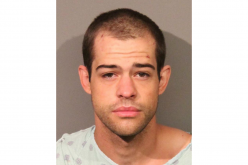Penryn man receives two life sentences for torture and murder
PENRYN — Drug dealer Donald Hugh Sherman of Penryn was given two consecutive life sentences without the possibility of parole for ordering the torture and murder of his cousin, whom he suspected of stealing chemicals used in the illegal manufacturing of methamphetamine.
A second defendant, Peter Schoemig of Reno, received a sentence of 25 years to life in state prison for injecting the victim, Guy Farmer, 37, with a fatal dose of crushed prescription pills during the Labor Day weekend of 2006.
The sentences were imposed by Placer County Superior Court Judge J. Richard Couzens, who presided over the three-month trial that featured separate juries for each defendant.
The jury for 44-year-old Sherman was the first to return with a verdict on Oct. 26, finding him guilty of first-degree murder and of torture. The jury determined that two special circumstances — the use of torture and the use of poison, or the crushed pills — were true.
In addition, the jury found Sherman guilty of various charges of illegal possession of weapons and drugs. Those convictions added another 17 years and eight months to Sherman’s two life terms.
The jury for Schoemig, 32, returned on Oct. 30 with a verdict of guilty of first-degree murder. The jury acquitted him of a charge of torture.
Prosecuting the case for the Placer County District Attorney’s Office were David Tellman and Doug Van Breemen.
During trial, the prosecutors told the juries that Farmer was tortured in Sherman’s garage because Sherman believed his cousin had stolen bottles of chemicals needed in his drug-making operation.
Tellman and Van Breemen presented evidence and witnesses to give the following account:
Unable to get a confession from Farmer, Sherman hired three “enforcers” from Stockton to work the victim over. The enforcers arrived at Sherman’s home on Sept. 5, tied up Farmer and beat and kicked him.
They then used a hammer to strike him on the knees and legs and later used an acetylene torch to burn one of his boot-covered feet.
The missing chemicals were never found and the enforcers were paid off in drugs and cash by Sherman and eventually left.
Farmer, left alone in the locked garage, broke free of his bonds and made an unsuccessful try at starting a vehicle inside to drive through the garage doors. He was also yelling that he would go to the police and “tell on all of you.”
Sherman, carrying a firearm, and three others, including Schoemig, entered the garage, recaptured Farmer and again tied him up.
Concerned over his cousin’s threat to go to the police, Sherman decided to kill Farmer with poison by using a solution of the crushed prescription pills. The job of injecting Farmer was left to Schoemig.
After Farmer died, his body was loaded into a pickup truck and Schoemig and another of Sherman’s men, Juan Alvaro Figueroa, drove to a mine shaft outside of Reno and dumped the body, which was found a month later by two men driving around the mines in a Jeep.
Washoe County authorities investigated, linked the crime to Placer County and handed the case off to Placer sheriff’s detectives, who focused on Sherman and his subordinates, including Figueroa and Brian Carr, both 47 and both of whom pleaded to lesser offenses in exchange for testimony on behalf of the prosecution.
Carr was convicted last March for false imprisonment by violence and being an accessory after the fact and he admitted a special allegation of being armed with a firearm. He received three years in the county jail.
Figueroa will be sentenced Tuesday for false imprisonment by violence, dissuading a witness and being an accessory after the fact. He faces a six-year prison sentence.
During trial, Sherman’s attorney, Kyle Knapp, tried to convince the jury that his client did not order the torture or killing of Farmer. He blamed the enforcers and other men on the property as the ones who orchestrated the crimes. He said Sherman, under duress, had been unable to control them.
Van Breemen told the jury that Sherman was not under duress and was the one who hired the torturers.
Knapp told Judge Couzens that a sentence of two life terms was “disproportionate” and requested it be cut to one life term. He said Sherman had clearly “lost his way,” but that he’d often helped out Farmer.
Couzens denied the request, saying, “Yes, he did lose his way, but he was directly involved in the conduct leading to Mr. Farmer’s death.”
Schoemig’s attorney, Richard Corbin, filed a motion with the court to have the murder conviction reduced to involuntary manslaughter, which carries a penalty of four years in state prison.
Corbin said Schoemig lacked a criminal record and that he acted under duress because if he didn’t carry out his orders, he and his family would be in harm’s way. “My client was made a scapegoat,” Corbin said.
Tellman argued that it was Schoemig who willingly aligned himself with Sherman and who “threw himself feet first” into the illicit world of drugs.
Couzens agreed, saying “I find quite sufficient evidence to justify first-degree murder.” He then denied Corbin’s request for involuntary manslaughter.














